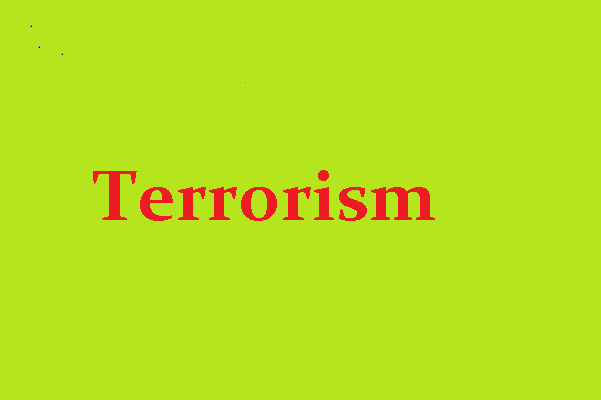Terrorism has become a global issue which causing hindrance for the existence of humanity on earth. In this 21st century we are facing the threat of religious terrorism. Terrorist have taken the frame of religion to complete their goals by installing fear among people.
Using Terror to establish specific goals is strictly condemn-able, but sometimes one man’s terrorist is another man’s freedom fighter. It’s all a matter of perspective in most cases. Terrorism gets its peak in poverty land, dominating of ideology on other ideology, differing between race of human on basis of (colour, wealth, work, land).
Terrorism
It is a term, defines to those people who uses force or indiscriminate violence against innocent people with the objectives of gaining political or religious support. Actually, Terrorism in broader sense, defines that extremist having the belief to create the terror by killing masses of people, or fear among the innocent people to achieve political or religious aim.
The terms “terrorist” and “terrorism” originated during the French Revolution of the late 18th century. In course of time, they extend their ideology. And gained mainstream popularity in the 1970s in news reports and books covering the conflicts in Northern Ireland, the Basque Country and Palestine. The increased use of suicide attacks from the 1980s onwards was typified by the September 11 attacks in New York City and Washington, D.C. in 2001.
You won’t believe but there is atleast 170 terrorist organization throughout the world. The UNSC has officially designated them as terrorist organization. Muslim Brotherhood, Irish National Liberation Army, Hezbollah, , Islamic Jihad, Taliban, Lashkar-e-Taiba, Balochistan liberation army, Tehrik-i-Taliban Pakistan, Khalistan zindabad force, Indian Mujahideen etc. Terrorism is not related to particular religion, race or an ideology.
ISIS- a terrorist organization
Osama Bin Laden is the founder of Al-Qaeda in 1988, ISIS (Islamic State of Iraq and Syria). The Islamic state of Iraq and Syria was a militant Salafist Jihadist group. Their aimed is to establish an Islamic state in Sunni, Arab-majority areas of Iraq during the Iraq war. Later, they also intended to establish Islamic state in Syria during the Syrian Civil War. They were the Muslim fighters who fought the soviets, following their invasion of Afghanistan. Now their objective is to eradicate American military and culture from the Middle East and to form a strict Islamic rule. Hamas is a group whose aim is to establish an Islamic state in the GAZA strip by opposing the Israel government. Similar to Islamic terrorism, Christianity, Hinduism, Judaism has also witnessed their militant organization
History of Terrorism
The history of terrorism is as old as human presence on earth. Terrorism is nothing but installing a sense of fear among people.
(i) Sicarri used the dagger to murder the Roman aristocrat in Public places. Their name literally means assassins or murders or the dagger to the men. The terrorism of siccari was nothing but a Jewish resistance, who resisted the rule of Roman. Although, they could not be called as a terrorist in modern, but the method of killing the people in public places and terrorize the people made them terrorist.
(ii) The word, “Terrorism” first appears in English in 1795 in reference to the Jacobins of France whose leader was Maximilian Robespierre, who ruled during the ‘Reign of Terror”. The word came into existence from a French word ‘Terrorisme’. Because at that time, Maximilian butchered or slaughter the Royal family. Maximilian Robespierre started the modern “Reign of terror”. Point must be noted here that he was neither the Muslim nor the Hindu. Later, he tried to eradicate the Christianity despite he was a christian. In his opinion, “Terror is nothing but justice, Prompt and flexible”
(iii) Narodnaya Volya was 19th century revolutionary political organization in the Russian empire. They target to the government officials by killing in an attempt to promote reforms in the country. Later, they become the terrorist organization. They wanted to have democratic reforms in Russian political structure. And they saw terrorism as an important tactic to achieve their political objectives. So that, they used to target violence against government family members and government officials.
(iv) Another early terrorist organization was the Irish republican brotherhood founded in 1858. They carried out attacks in England and their objective was to establish independent democratic republic in Ireland rather than being a part of Great Britain.
India against Terrorism
It had affected the India since very long time causing deaths of the hundreds of Indian citizens. It becomes the widespread presence of organized crimes, inhibiting the development of India. India always stand to take stringent steps to deal with the terrorism. Being a democratic, liberal and soft power, India deals with the terrorism strictly within the limits of national and international laws. India does not go for the incessant killing to eradicate the terrorism (which can make the situation harsh).
India always goes for pre-emptive action so that the military or citizen would not get affected. Most of its approach are diplomatic negotiations. Its actions are mostly Knee-Jerk reactions and the government takes short term measures more prominently after any terrorist attack rather than carving a careful plan.
India’s Approaches to Combat the Menace of Indiscriminate Violence
1. National Laws Against the Unlawful Activities
(i) Unlawful Activities (Prevention) Amendment Act, 1963 (the most recent amendment has been done in 2012) -Its main objective is to deal with the unlawful activities which is against the integrity and sovereignty and it also include Financial action Task Force (an intergovernmental organization to combat the money laundering and terrorism financing).
(ii) Armed Forces (Special Powers) Act,1958 – Under this act the Armed Forces is granted special powers in which each act terms “Disturbed Areas”. Use any kind of force (including lethal force) as consider necessary against the person who is “acting to disrupt the law and order. This is conditional on a prior warning from the security personnel. According to The Disturbed Areas (Special Courts) Act, 1976 once declared ‘disturbed’, the area has to maintain status quo for a minimum of 3 months. One such Act passed on 11 September 1958 was applicable to the Naga Hills, then part of Assam.
(iii) Prevention of Terrorism Act (POTA) 2002 – Indian Parliament passed this act, with the objective of strengthening anti-terrorism operations. It replaced the POTO (prevention of Terrorism Ordinance) of 2001 and TADA (Terrorist and Disruptive Act) of (1985-89). The Act defined what constituted a “terrorist act” and who a “terrorist” was, and granted special powers to the investigating authorities described under the Act. The act was repealed in 2004.
(iv) Parliament has passed many Act including the above Acts to restrict or inhibit the growth of violence against the citizens of India
International Diplomacy:
India has long fought and opposed the terrorism and its sources. However, India does not believe in attacking the whole country and the region of emanating from, as it damages more innocents than the terrorists. Therefore, it focuses and assert more of diplomacy, isolation of countries supporting terrorism rather than war and violence. Indian diplomacy focuses on the vision that International terrorism cannot effectively be fought alone, as has been our experience so far. India whole-heartedly supports any United Nations actions to counter terrorism.
India has also been pushing Comprehensive Convention on International Terrorism (CCIT) since 1996 in UN. The proposed convention was intended to provide umbrella cover for situations not to address the existing sectoral conventions on terrorism. I was concluded under the auspices of the UN. The CCIT is described as the mother of all anti-terrorism conventions.
3. Counter terrorism Agencies:
The number of agencies like intelligence, military, and police organizations manages the indiscriminate violence. Some of these are state police forces, paramilitary forces; Military services personnel like army, navy, air force etc. Paramilitary forces are specialized in nature like CRPF in disturbed areas, BSF in border areas, NSG for countering terrorist attacks and so on. The army usually participates in counter terrorism operations as a last resort, though in Jammu and Kashmir they play a more consistent role. The intelligence agencies that monitor terrorist activities in India are The Research and Analysis Wing (RAW), acting as the external intelligence agency and the Intelligence Bureau (IB), collecting intelligence along with the military intelligence are functional in India.
4. Impact of ISIS on India
ISIS has been most lethal, organized and modern terrorist organization who are using social media, internet to propagate their ideology. However, ISIS has affected the India too (in 26/11 Mumbai terror attack killed many innocent), despite barring the sporadic incidents. Few Indian youth have joined the ISIS forces in Iraq and Syria after they got influence from the structured propaganda of ISIS. In addition to this, Mehdi Masroor Biswas was operating the twitter handle of ISIS from Bangalore in India. Apart from all these, India has neither faced any violent assault nor any lone-wolf attack on its land by ISIS. However, ISIS wants to attack India and convert it into Islamic caliphate of Khorasan in future.
5. India’s Collaboration with other countries to counter the terrorist
(i) India persistently collaborates with the other countries who have faced the terrorism to combat the menace the of terrorism. Even, it supports the UN in its effort to counter it. India has signed various deals and agreements with many countries for sharing terrorist intelligence. Even, also inhibiting organized crimes to cut the supportive infrastructure of terrorists and so on
(ii) India also has cooperation with EU, Australia, Canada etc, on cooperation in Counter-Terrorism, Cyber-security, Non-proliferation and Disarmament.
(iii) The leaders of India and US have admitted that the terrorist has raised the threat for the human civilization. They condemned the recent terrorist incidents from Paris to Pathankot, from Brussels to Kabul. These two countries have signed joint declaration in combating the menace.
(iv) India and Russia have signed a Memorandum of Understanding on cooperation in combating terrorism in 2002.They have also joint working group on Combating International Terrorism meets from time to time.
(v) Japan, along with India condemns the terrorist activities in strongest terms in all its forms and manifestations in the spirit of ‘zero tolerance’. The two countries keep calling upon all countries to implement the UNSC Resolution 1267 and other relevant resolutions designating terrorist entities.

